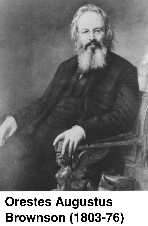In a previous post, I pointed out a second group in the nineteenth century that was bent on setting up government-controlled education for its own ideological purposes. Led by Robert Owen, this group sought to educate Americans out of their belief in private property and free enterprise. They set up the Workingmen’s Party to achieve their goal.
 One of the party’s adherents was Orestes Brownson. Later in life, he defected from the party and his old beliefs, and turned to the Catholic Church for his Christian foundations. He then wrote about why he and others had been so devoted to the party. His frankness lets us see into the philosophy and the motives of this group. Brownson confessed:
One of the party’s adherents was Orestes Brownson. Later in life, he defected from the party and his old beliefs, and turned to the Catholic Church for his Christian foundations. He then wrote about why he and others had been so devoted to the party. His frankness lets us see into the philosophy and the motives of this group. Brownson confessed:
The purpose in the formation of this party was to get contol of the political power of the state, so as to be able to use it for establishing our system of schools.
What was the strategy used by him and by his comrades? He explains further:
We hoped, by linking our cause with the ultra-democratic sentiment of the country, which had an anti-Christian character, by professing ourselves the bold and uncompromising champions of equality, by expressing a great love for the people, and a deep sympathy with the laborer, whom we represented as defrauded and oppressed by his employer, by denouncing all proprietors as aristocrats . . .
Stop there for a minute. Does any of that sound familiar? Isn’t there a segment of our population today that is openly anti-Christian? Don’t they try to set themselves up as the champions of the little people, promoting equality and denouncing employers as out-of-touch aristocrats? You see, the circumstances may change over time, but the approach is remarkably similar.
Well, now that Brownson has disclosed the strategy, how does he continue?
. . . and by keeping the more unpopular features of our plan as far in the background as possible . . .
That’s another good stopping point. We see the same tactic today: some politicians always seek to hide what they are really attempting to do. They dress up their program with nice-sounding phrases [“public option” comes to mind], while concealing what they are actually intending. The hope is that they will be able to fool enough people to accomplish their purposes. That’s exactly what Brownson is saying here:
. . . to enlist the majority of the American people under the banner of the Working-Men’s Party; nothing doubting that, if we could once raise the party to power, we could use it to secure the adoption of our educational system.
There you have it, spelled out quite clearly—use government-controlled education to achieve ideological goals. Yet, as with the Unitarians, who also wanted to create a government system, there just weren’t enough communist-minded Americans at this time to make it happen.
It would require a third group—more numerous, more influential—to make it a reality. Who was this group? I’ll let you know in a future post.
